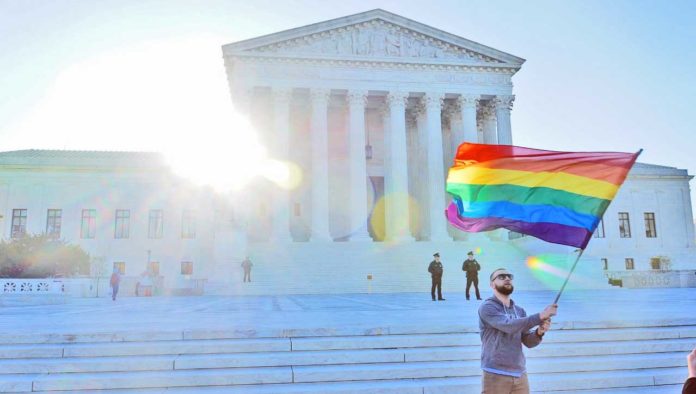The United States Supreme Courts’ hearing of Little Sisters of the Poor Saints Peter and Paul Home v. Pennsylvania and Trump v. Pennsylvania is escaping the LGBTQ community’s attention largely because it has been masquerading as a birth control issue. Heard on May 6, but not yet decided, this case will determine whether an employer can deny contraception coverage to its employees by claiming a religious or moral exemption. Little Sisters of the Poor is, of course, an important case for women’s rights — and, on its face, contraception isn’t tan LGBTQ-specific issue. But, whatever the conservative-majority court decides will have far-reaching implications for religious discrimination.
Under the Obama-era Affordable Care Act, birth control is covered as part of a basic women’s healthcare plan. As Lindsey Kaley, staff attorney for the national ACLU rightly pointed out, many women use birth control for reasons other than contraception.
In a quiet move, the Trump administration broadened restrictions on the types of employers that are allowed to withhold contraception coverage for religious reasons. In effect, religious objectors are allowed to throw contraception coverage costs back on state healthcare. Spearheaded by Pennsylvania, states vehemently objected to carrying the additional cost that exemptions would cause. If the court rules in favor of religious objectors, employers could be able to lawfully deny healthcare coverage to LGBTQ employees. Would a religious exemption allow a company to deny family benefits to a same-sex couple? Or, would a religious exemption allow a company to deny coverage for HIV treatment? Would religious objectors deny coverage outright based on someone’s sexual orientation?
Katherine Franke, with Columbia Law School’s The Law, Rights and Religion Project, wrote that “[Little Sisters of the Poor] offers an opportunity for the Court to consider how religious liberty rights should be balanced against other fundamental rights; in this case, reproductive liberty. […] So, too, it will be instructive to hear how the parties and the Justices weigh the state’s compelling interest in protecting health care when faced with a religious challenge thereto.” The last line is of particular importance because it generalizes the implications. This decision carries an explicit threat to women’s access to birth control, but also the broader implicit threat of “moral” or religious discrimination. This is what makes Little Sisters of the Poor an important case for the LGBTQ community.
There is a long history of religious groups that have specifically targeted the LGBTQ community. In 2018’s Masterpiece Cakeshop v. Colorado Civil Rights Commission ruling, SCOTUS deliberated on if a cakeshop had the right to deny a wedding cake to a gay couple based on First Amendment protections of free speech and free exercise of religion. The court reversed the Colorado Commission’s decision and ruled in favor of Masterpiece Cakeshop. In the 2014 Hobby Lobby SCOTUS decision, which eerily echoes Little Sisters of the Poor, SCOTUS allowed employers to “line-item veto” birth control coverage from employees’ health plans. Then, in 2018, two evangelical groups in Texas used the Hobby Lobby case as precedent to file multiple state and federal lawsuits claiming that religious businesses and churches should have the right to withhold employment from LGBTQ workers. This is precisely what could happen if the courts decide in favor of religious objectors in Little Sisters of the Poor.
Of the broader picture, Kaley said, “The reason [Litte Sisters of the Poor] certainly connects to other marginalized communities is that some of the people most impacted, if this rule goes into effect, will really be low wage workers and others who are struggling to make ends meet and already face barriers to care like people of color and LGBTQ people.”
“The issue at the core of [Little Sisters of the Poor and Trump],” continued Kaley, “is that if the Trump administration wins this case, it could set a dangerous precedent for allowing religion to be used as justification for policies that encourage discrimination. It could embolden individuals who would use religion to discriminate even when it harms others. We’ve already seen arguments to that extent that would impact the LGBTQ community as well. That core issue is that people should not be able to use religion to discriminate against others. This is something that certainly transcends the benefit of birth control.”
The Supreme Court will soon hear another anxiety-provoking case for the LGBTQ community: R.G. & G.R. Harris Funeral Homes v. EEOC and Aimee Stephens. Aimee Stephens was fired from her job at a funeral home after her employers learned that she was trans. In a tragic twist, Stephens passed away this Tuesday, leaving the landmark case without a plaintiff. Whether or not the case continues, Kaley could not comment on behalf of the ACLU. “We are trying our best,” said Kaley.
